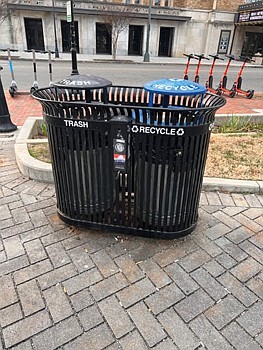VCU’s rat de-bait
State senator sounds alarm over Monroe Park rodents
Jeremy M. Lazarus | 12/28/2023, 6 p.m.

Virginia Commonwealth University claims that rats in Monroe Park can rip open metal trash cans to get to discarded food—even though an inspection of the metal cans show that the bottoms are undamaged. The university, which handles maintenance of the park, issued that claim in response to a query from Richmond state Sen. Ghazal Hashmi about VCU’s expenditure of $2,400 a month to spread poison-bait rat traps throughout the city’s oldest park.
According to VCU, “in most cases the rats are accessing discarded food in city-provided waste receptacles by tunneling underneath them and not via the open area at the top.”
The Free Press was provided a copy of the response. In a follow-up to a newspaper query, VCU stated that the baited stations reflect the university’s effort to “protect the health and safety of the VCU community and the public as rats are known to spread disease, trigger allergic reactions, harm trees and plants, and cause property damage.”
VCU did not indicate whether the traps were working to reduce the rat population or explain the claim of rats being able to get through the metal bottoms of the trash receptacles.
Monroe Park, located on Belvidere Street, dates to the early 1850s and serves as the gateway to VCU’s academic campus.
Charles Woodson, an advocate for the park, calls VCU’s response fiction and charges that the school has violated its own code of ethics with an “explanation that is easily disproved. Lying to a state senator is a big deal.”
VCU’s ethics code states the university is committed to creating “an environment of uncompromising integrity and ethical conduct” and includes, among other things, a pledge to “act and communicate honestly and candidly. We will not mislead others,”
Mr. Woodson, who sparked Sen. Hashmi’s query, said he believes VCU made up the story about metal biting rats in trying to fend off critics like him who object to the use of poison pellets that he said can kill birds, dogs, squirrels and other animals.
A member of the city’s Urban Design Committee, Mr. Woodson said he has inspected every one of the trash receptacles. All “have metal bottoms that are completely intact,” he said, and sit on paved surfaces.
The city-owned green space was given a $7 million facelift and reopened in 2018 under the management of the Monroe Park Conservancy, a nonprofit whose board includes city executives and private individuals.
VCU informed Sen Hashmi that the school has an agreement with the city and the conservancy to provide police patrols and handle park maintenance, such as mowing and clearing snow as well as tackling the rat problem.
According to the school, the park was found in the fall to have a growing rat population that appeared to stem from people failing to properly dispose of uneaten food.
VCU responded by hiring an exterminator to place 24 plastic rock-shaped bait traps around the park with the company being paid $100 per trap to keep them full of bait and to replace any that are broken. VCU stated the traps have a design that only allows rats or mice to crawl into them to get to the poison bait.
VCU advised Sen. Hashmi the traps are discreet, tamper-proof and weather resistant. VCU did not include any information as to whether the bait traps have reduced the rat population.
Mr. Woodson is still campaigning to get rid of the bait traps as a threat to other wildlife.






